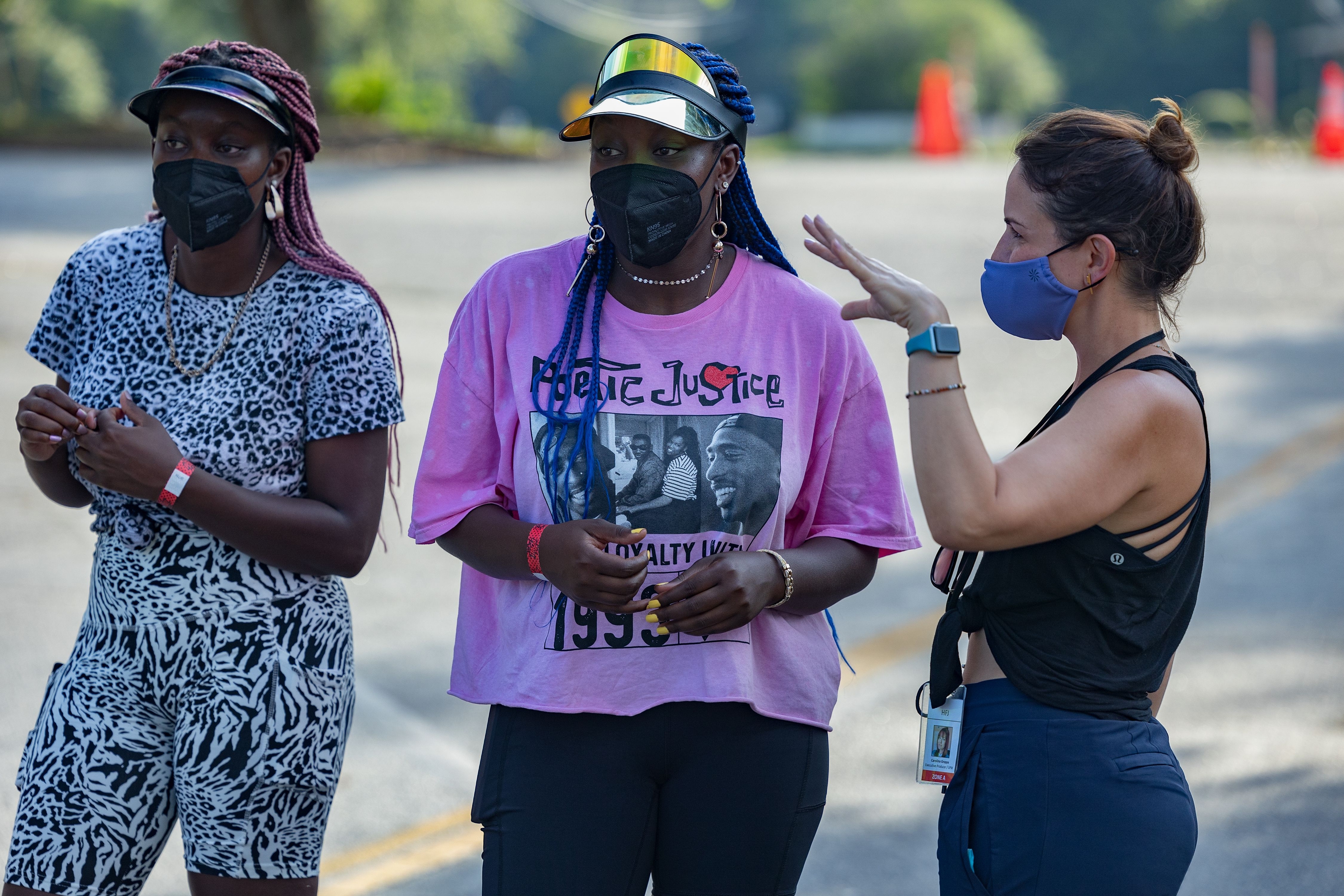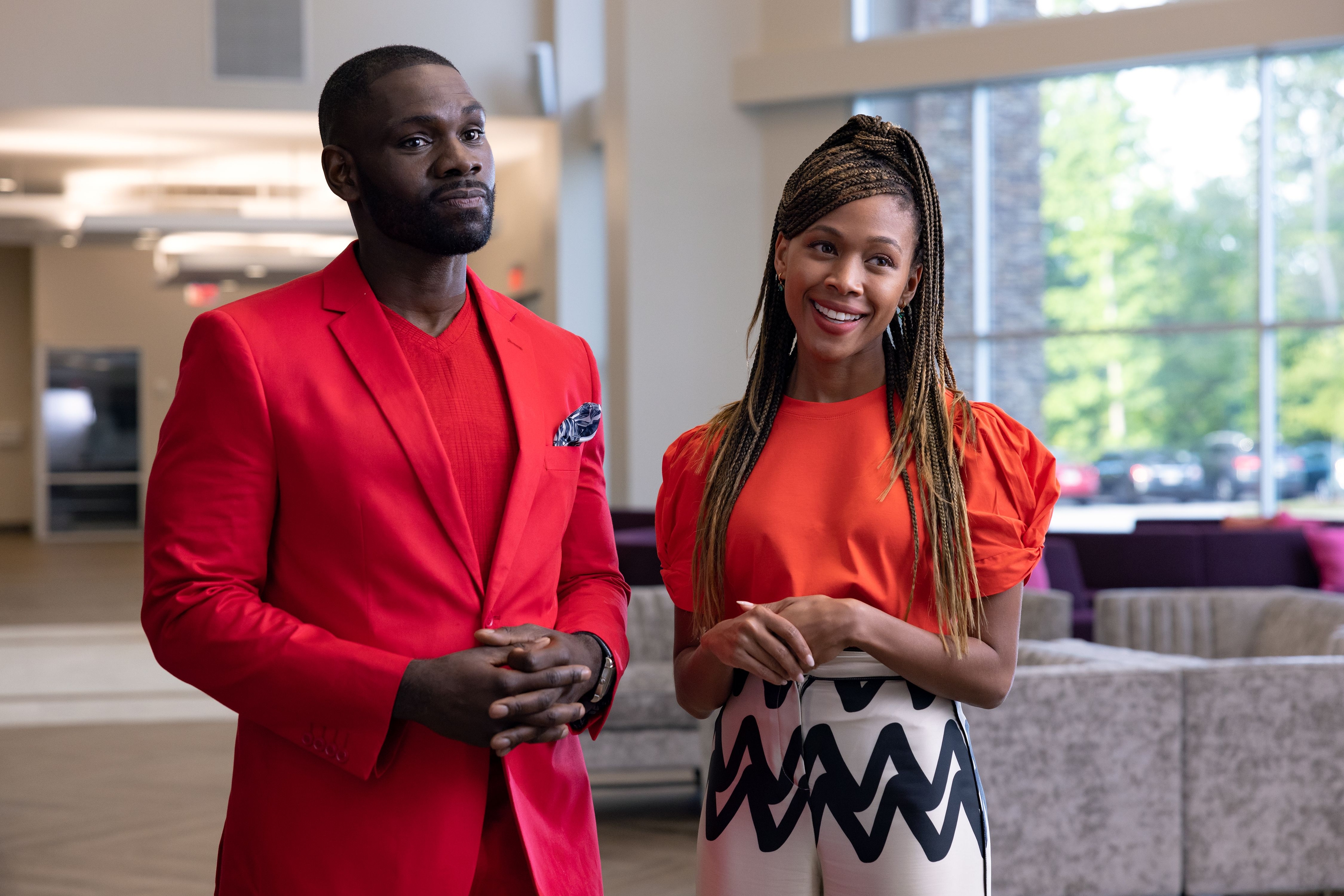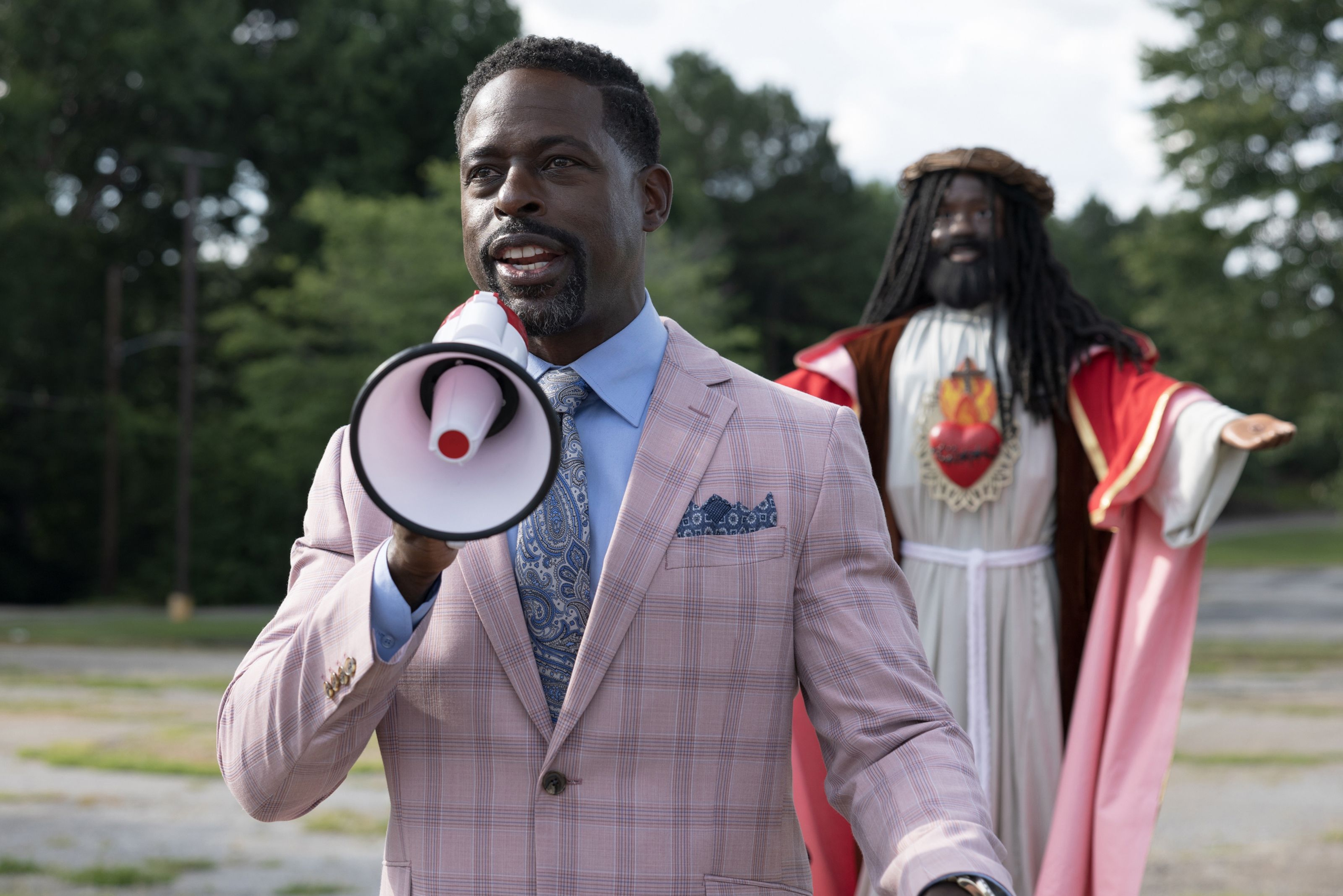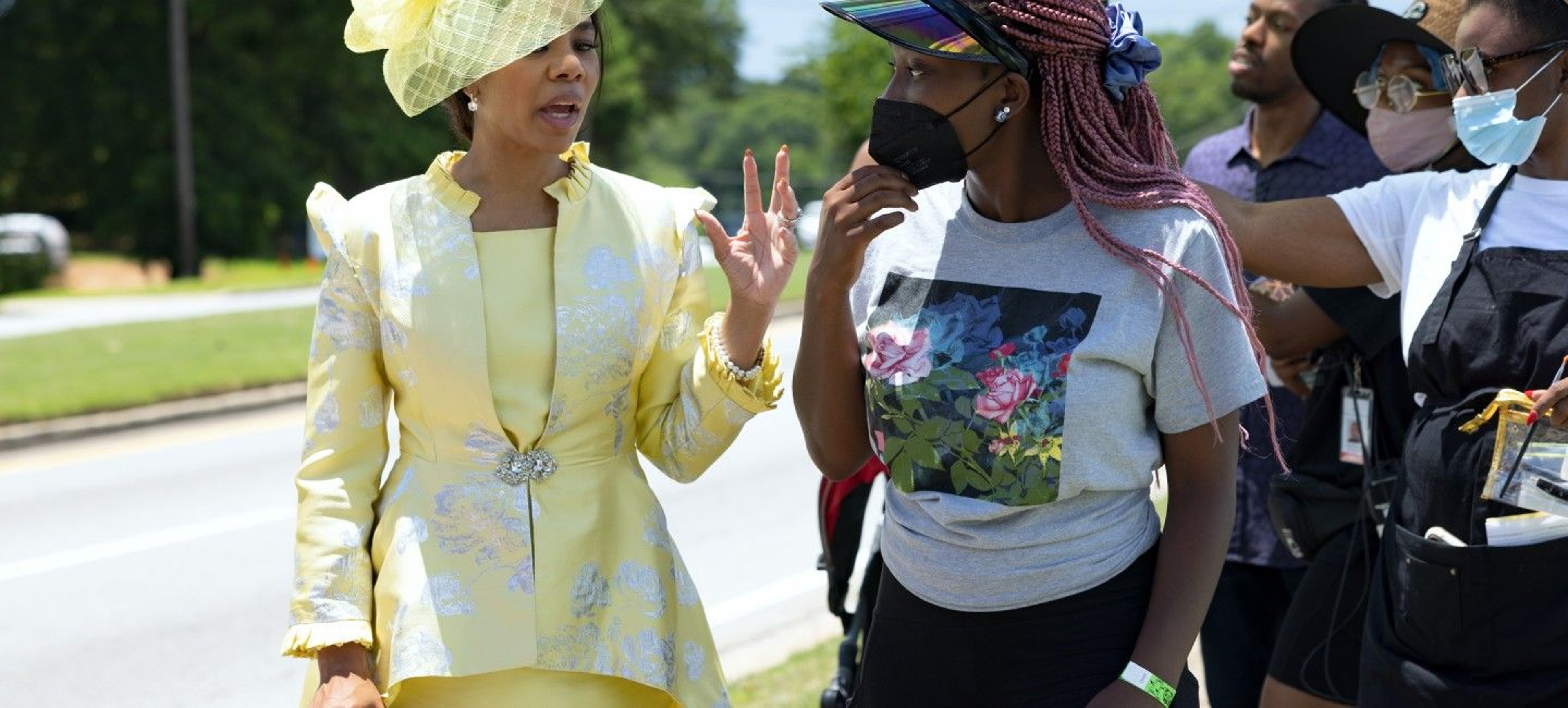From Sundance to the Silver Screen: The Ebo Twins Make a Statement with Honk for Jesus. Save Your Soul. Debut
Adamma and Adanne Ebo are making Hollywood pay attention with their debut feature film, Honk for Jesus. Save Your Soul. The satirical comedy—produced in part by Jordan Peele’s MonkeyPaw and Daniel Kaluuya’s 59% production companies— follows the mockumentary style redemption story of a mega-church pastor (Sterling K. Brown) and his wife (Regina Hall), after a public scandal causes them to lose their congregation, support, and aspects of their marriage. For the twin sisters, who hail from Atlanta, this film reflects parts of their upbringing and holds a mirror up to some of the blind spots they and many others have experienced in faith spaces they were raised in. Honk for Jesus. is a layered comedy that evokes a wide variety of emotions and thoughts. With powerful performances from Regina Hall and Sterling K. Brown, and the screens it will play on across the nation this Fall— it is sure to stir some much needed conversation, and at the same time, it is also an introduction to two powerful and talented voices who have something to say. They just happen to say it better and louder, together.
With Adamma writing and directing the film, and Adanne helping to produce it, the film’s seven year journey from a short to Sundance to the silver screen always had a constant— their unbreakable bond. Now, the Ebo twins are opening up about what sharing their film with the world feels like, their creative process, their faith, landing their leads, and most importantly, what they hope to do next now that Hollywood is watching.
- Gia Peppers
GP: First, congrats on all of this! Let’s go back to beginning and talk about your upbringing in the church— because you had to have such a powerful experience with the church to be able to also critique it.
Adanne: Well, we just- we grew up in the church. We come from church-going people and we were in the South so that's what you did.
Adamma: A lot of Baptists.
Adanne: A lot of Baptists… You just go to church. I think that even though we grew up in the church, our parents were different because they encouraged critical thinking and they encouraged us to ask questions. Now that I think about it, it's kind of a strange place to live in. I don’t know how they were quite able to pull that off, but because of that we did ask a lot of questions of the church. I think we started becoming disillusioned with it, honestly, very early. Before or around age 10, one of my most vivid memories is hearing our pastor give an entire sermon about the evils of Harry Potter. We're big Harry Potter fans and we love Harry Potter. So we were, like, “Oh no, I gotta tap out.” I was, like, I gotta reassess some stuff.
Adamma and Adanne, in unison: And it’s not going to be Harry Potter.
Adanne: I think that was one of my first memories of really questioning… What is this? How does it relate to me and my life? Can I exist within this space and still be who I am and love what I love? It just devolved from there.
GP: I love that you're honest about that. I grew up in church, too, been a church girl my whole life, and we are taught not to question it. So, shout out to your parents for knowing that God is big enough for you to be able to question things. The film does a great job in calling out the difference between having a relationship with church and having one with God—and unfortunately, those can be two separate things. Is that one of the themes that you wanted the film to tackle head-on?
Adamma: 100 percent. I think oftentimes, when discussing religion and peoples’ faith, it can fall into demonizing—no pun intended—the fact that people believe in a higher power. And I don't think that's where the issue is. I don’t think feeling spiritual is the issue. The issue is when we get unchecked power and these institutions that believe in money over everything else and don't care about people they way they purport to care about people. I think that was part of our spiritual journey. Being in it, straying from it, and then coming back and taking the aspects of it that serve us and make us the happiest, the most fulfilled and at peace.
Adanne: And leaving the rest of it.
Adamma: And y’all can keep the rest of it. I’ll keep “The Boy Who Lived.”

GP: This has been a really long journey. From the short, to Sundance, before that in school, and now finally to the silver screen. How long has it actually been that y'all have been working on “Honk for Jesus”? And I know it had other names…
Adamma: The very first draft of the script started being written in late 2014 and then finished in 2015… It was originally called “Love and Locusts and Leviticus then Lambs,” and it changed, obviously. Not to anything shorter really, or clearer, but we've been living with it for years.
GP: Are you excited now to be able to move to different things now that it's going to be out into the world? Your “baby” is in the world and it does free up some time.
Adanne: We’re definitely ready… It’s amazing that we are able to bring it out to the world in this fashion. I don’t think we ever—well, we didn't think it was going to get made at all. Every step of the way was a surprise. It was like, “Oh, y’all like this? Oh, you want to make it? Oh, you want to finance it? Oh, you want to get it into Sundance? Oh, you want to buy it and put it out in this fashion?” We were shocked every step of the way. So, we're definitely grateful for that.
Adamma: We have more stories to tell. And—it’s very meaningful that this is the first.
GP: Gina Prince Bythewood gives this advice to rising filmmakers all the time—to make your first film the thing that you want to be known for because it's your introduction to the industry. Love and Basketball was her introduction. We know a lot about her from that film. What do you think we know about the Ebo Twins from this? What do you hope this says about who you are as creatives and people?
Adamma: From now on, I think that people will know to expect a particular type of tone from us. It was hard pitching the tone. In large part, I think it was hard pitching the tone because we're Black women and they were expecting something specific from Black women. I think people are going to know us for… "It's not gon’ be what you expect, it’s never going to be what you expect. Whatever it seems like on the surface, there's something else underneath.”
Adanne: Expect the unexpected.
Adamma: And, I think there’s always going to be some exploration of duality. I think people are multifaceted. We're twins; we're Geminis. So, yea.
GP: “Expect the unexpected.” That's what we know from Monkeypaw, if anything. Jordan [Peele] is going to give us something meaningful—a little scary and a little uncomfortable—but it'll blow our minds. Do you think that's why Jordan Peele was immediately drawn to this script and was on board to produce? Because it's in his wheelhouse of the unexpected?
Adanne: I think so. Jordan is now up there as one of the horror masters of the cultural zeitgeist, to the point where people forget that he started out as a comedian. I was surprised when Get Out came out because I was like, “You mean, Jordan Peele of ‘Key and Peele’? is doing horror?” Now, a few years later, he’s this horror master. The first time we spoke to Jordan, he said he was looking back into comedy because comedy and horror are not that different—in both, it's all about timing… I think our comedy [in the film] is really what hooked Jordan. He said, “I could not stop laughing and I have not laughed that way in a long time,” which was very heartening for us to hear.

GP: I still watch old episodes of “Key & Peele” just to laugh… First, Jordan Peele, and then— you got Sterling K. Brown and Regina Hall to play the lead characters in your debut feature film. How did that come about and why do you think they were the perfect two to tell this story?
Adamma: Regina was always the archetype for us because we knew we wanted someone who could handle a specific tone and we definitely knew she had the comedy chops to do it. She’s also been doing some really interesting dramatic work that we knew we wanted the character to get into as the film went on. When we first talked to Daniel [Kaluuya] and he asked who we wanted to be the First Lady, we said a “Regina Hall type,” and 59% made it happen. Rowan Riley knew Regina's agent and was like, “I can slip them the script and we can see what they think.” Regina dug it, and we met for the first time at the top of 2020 she said “yes” in the room. She said, "I want to make this if y'all want to make it— ”
Adannè: “—and I'm ready when y'all are.” The first time we met in person it was Adamma and I, Regina, and our two producers from 59%—which is Daniel's company, Rowan Riley, and Amandla Crichlow. It was all women, and three of the women were Black women outside of Regina [at the table]. She told me that, in and of itself, made our first meeting so impactful. Outside of the script and story, she said the meeting made her feel like this was something that she needed to do. It's special. It feels special. Sterling came later. Our search for Lee Curtis was a longer process. And again, shout out to 59%, because I believe it was Amandla who brought up Sterling's name and we weren't sure that Sterling was funny.
Adamma: We knew he was talented but we wanted someone who could do comedy.
Adanne: Exactly, so we did a little digging and found out that he got nominated for an Emmy for guest starring on an episode of “Brooklyn Nine Nine” where he plays this narcissistic dentist and it's very deadpan comedy, and he absolutely kills it. He's hilarious. When we finally spoke to him, he talked about his own relationship with faith and the church and everything. We knew this was absolutely the right move, we just needed him and Regina to connect. The first time they met on Zoom, the chemistry was instantaneous. We were like, this is it—we’ll do whatever we have to do to make this work! The schedule for “This is Us” was coming for us… but God! He made it work… The performances are astounding.
Adamma: It’s my favorite part of the movie. It’s what I'm the most proud of. I'm definitely proud of the writing, but we really honed in on these characters through their performances.
GP: We haven’t really seen this type of storytelling from the Pastoral/church leader side, I don't think, ever. They were dealing with all types of things, but it was a real portrayal and I appreciate that. The concepts of church and religion are quite serious. They're heavy spaces and institutions to critique, even still on today’s Internet… Did you hesitate in creating this story on such a big stage because there may be backlash? Were you ever concerned about the films’ reception?
Adanne: We were never concerned about backlash. We expect it, we were always intentional in the way that we would tell this story. We never wanted to make these characters caricatures. We never wanted the tone to fall into a farce or a parody, because [faith] is something that's very real to a lot of people, it's something that's very real to us. Even though we take this darkly comedic and satirical tone, we never wanted it to be like punching down at religion or punching down at the culture, because it's our culture. We mostly wanted to show it for what it is, instead of making a hardline statement on it.
Adamma: I think if the biggest issue that folks end up having with the film is that we are talking about it [the film’s scandal] at all, then I think there are bigger issues at hand and that's the point. We did our job. Y'all should probably do some soul searching. Pray on it, and maybe do a little more than pray on it. Talk to a therapist.

GP: Yes to Jesus and Therapy. The location of the church—the actual building—was also important. There was a lot of significance of choosing that church. Talk to me a little bit about selecting that location, because it plays such a major part of the film.
Adanne: Those are the types of churches that we grew up going to and that we knew growing up. We really didn't know people who went to small churches. Aesthetically, the churches would look like a Mom and Pop type of church, but they would just be humongous. It didn't look like the stadium type of church. We didn't want that feel we wanted a more homely feel to the church. We wanted it to have a specific type of beauty to it with the stained glass, with architecture, the furniture, the pews, all of that. I forgot that some churches don't have pews, they just have chairs. We wanted the films’ main church to have that older type of feel and aesthetic, so we were very adamant about shooting in Atlanta. There were conversations about shooting in LA but there's no churches that look or feel like that— it’s not going to work. Luckily enough, the church that we ended up shooting in was the same church we 1) shot the short at and 2) they're very filmmaker friendly. Had the right aesthetic and was a church that we frequented growing up. It's fifteen, twenty minutes from our parents’ house.
GP: Wow— a full circle moment, indeed.
Honk for Jesus. Save Your Soul. hits theaters and Peacock on September 2nd.
